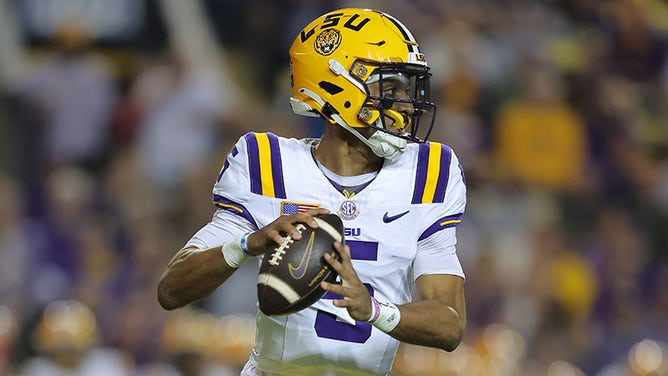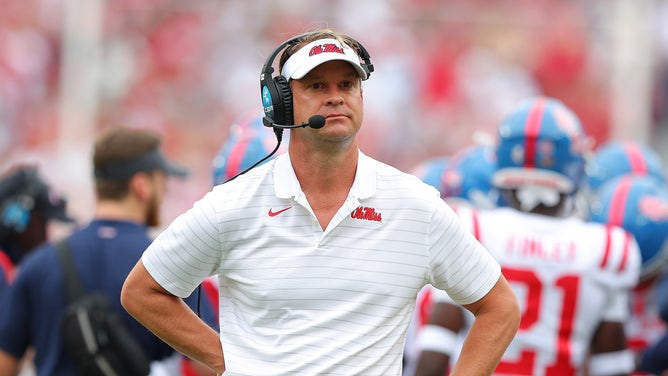College Football Programs Are Buying Players, Despite What Brian Kelly Wants You To Believe | Trey Wallace
LSU football coach Brian Kelly is still trying to toe the company line when it comes to NIL and buying players to compete for his team, but his opinion on not overpaying for high-profile athletes is a problem coaches around the country are dealing with on a daily basis.
We have certainly passed the point of return when it comes to using NIL to recruit some of the best talent in the country, whether that be from the transfer portal or high school. So when you hear a coach discuss the issue of ‘buying players’ and deny that they are in the business of using funds to put together a roster, it feels disingenuous.
But the problem that most head coaches in the sport are running into right now is the perception of their program, and the taboo language of how the sport has changed. The guys running collegiate programs around the country are still afraid of calling it what it is, which is purchasing players to enhance their roster. I understand that a lot of coaches in the profession are not comfortable when it comes to discussing a payroll or how they are using NIL funds to make sure they are good enough to compete for titles.
While this is still an ongoing issue when it comes to promoting your football program, a lot of head coaches are not as outspoken as a coach like Lane Kiffin, who has repeatedly used the term ‘Free Agency’ to describe the current market in collegiate sports.
Even with NIL playing such a major factor in recruiting, there are still plenty of high-profile teams trying to do it the old-fashioned way, which entails recruiting athletes that want to play for the brand and be developed within the program. And guess what? There's nothing wrong with this tactic, until that team starts to lose key games, or attrition strikes a position group. If you ask most coaches, the days of sticking with the old recruiting model, while providing NIL opportunities when an athlete reaches campus, are gone.
Thanks to an injunction from an East Tennessee judge, NIL Collectives can have open conversations about how much a player will make, before actually setting foot on the campus. This has turned recruiting into bidding wars.
Unfortunately, it's only going to get worse until some type of deal is put into place that would control the current market when it comes to financially stable teams. But there is still the massive word salad that some coaches love to use when it comes to how they are building a roster, especially when a number of those players come with a high price tag.

BATON ROUGE, LOUISIANA - NOVEMBER 11: Jayden Daniels #5 of the LSU Tigers throws the ball against the Florida Gators during a game at Tiger Stadium on November 11, 2023 in Baton Rouge, Louisiana. (Photo by Jonathan Bachman/Getty Images)
Is Brian Kelly Just Looking For Extra NIL Money From Donors?
This was the case for Brian Kelly during an interview that was released Tuesday night, where the LSU head coach was asked for his thoughts on where his team was when it comes to finding pieces that fit for his team. Maybe the head coach was sending a signal to his boosters that the program needed more money.
"Well, I think I made it pretty clear in a number of press conferences that I had that we were in the market in recruiting and the transfer portal for defensive linemen," Brian Kelly told WAFB. "It hasn't fared very well quite frankly cause we're selling something a little bit differently. That is why we want to recruit, engage, build relationships, develop, retain and have success.
"We're not in the market of buying players, and unfortunately, right now, that's what some guys are looking for. They want to be bought. Look, i understand NIL is a part of this, and we have an incredible collective. We have very generous opportunities around the greater Baton Rouge area for NIL opportunities. So, they are here, but we're not gonna go out and buy players, that's not what this is about and was never about that. We will develop you, we will get you ready for the next step, as we did with Jayden Daniels, as we did with Malik Nabors, as we did with Bryan Thomas. We developed three defensive linemen that all got drafted this past year and we'll do that again."
Again, I understand the hesitancy from coaches to call it what it is, which is paying players to contribute to the team. But we are way past the stage of some programs acting as is they are running some kind of straight program while others are out here running wild in this new era of college sports. If a coach wants to sit there with a straight face and act as if they aren't using NIL funds to purchase talent, then that's their right.
Brian Kelly would've made things easier for everyone listening to his comments if he would've just said that they are not going to overpay for an athlete in the portal or out of high school. Not giving in to every demand is an obvious way of thinking, and we've seen this in college sports during the last few years of NIL. There have been a number of high-profile players that carry a name that have asked for too much money in negotiations when it comes to staying at their current school.
NIL Collectives Are Not Going To Overpay Just To Appease A Player
In a lot of cases, a collective or NIL group will decide that even though an athlete is a beneficial player on the team, they are not worth the extra cash when it comes to a return on investment. We have seen teams move-on from players that end up in the transfer portal, which makes fans of the team scratch their heads, wondering why that defensive lineman decided to leave. A lot of times it comes down to the collective not wanting to waste additional money on a player that would potentially come with extra baggage if they were to have their demands met.
But make no mistake about it, major college football programs are compensating their star players in one form or another, and if that head coach says that they aren't buying their services, they'd be lying to you. What Brian Kelly said makes sense to fans on the surface, but i can promise you that there are athletes on the roster that did not choose LSU, or any school, because of how they could be developed.

TUSCALOOSA, ALABAMA - OCTOBER 02: Head coach Lane Kiffin of the Mississippi Rebels looks on against the Alabama Crimson Tide during the first half at Bryant-Denny Stadium on October 02, 2021 in Tuscaloosa, Alabama. (Photo by Kevin C. Cox/Getty Images)
It might work for some, but a majority of fans of college football are way too smart when it comes to the product in this NIL world. But as you can tell, LSU's Brian Kelly is hellbent on sticking with the narrative of when a player arrives, there are opportunities available to make money with NIL.
"If you're just looking to get paid, you're looking in the wrong place. If you like what we do here, and the development of players and bringing you into a championship program, playing for championships, and having NIL, you should be a Tiger."